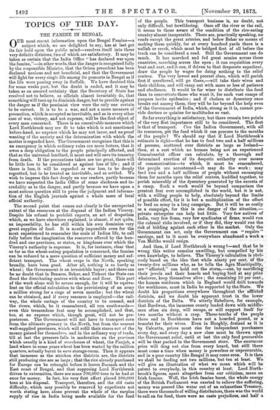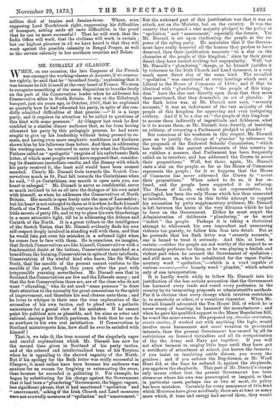TOPICS OF THE DAY.
THE FAMINE IN BENGAL.
OUR most recent information upon the Bengal Famine—a subject which, we are delighted to say, has at last got its fair hold upon the public mind—resolves itself into three very definite divisions, two of which are satisfactory. It may be taken as certain that the India Office " has declared war upon the famine,"—in other words, that the danger is recognised fully by the responsible Minister, that the Orissa precedent has been declared noxious and not beneficial, and that the Government will fight for every single life among its peasants in Bengal as if the life were passing away in Suffolk. We have doubted this for some weeks past, but the doubt is ended, and it may be taken as an assured certainty that the Secretary of State has resolved not to believe, as officials almost invariably do, that something will turn up to diminish danger, but to provide against the danger as if the pessimist view were the only one certain to be correct. It is to be a war, and not a mere measure of precaution, which is accepted as inevitable, and as in every other case of war, victory, and not expense, will be the first object of every man concerned. There is no conceivable measure which Lord Northbrook may see fit to take which is not sanctioned before-hand, no expense which he may not incur, and no proof wanting of the anxiety and the determination with which the matter is regarded here. The Government recognises that this is an emergency in which ordinary rules are mere fetters, that it owes a deep obligation to the people principally affected, and that as the universal landlord, it must and will save its tenantry from death. If the precautions taken are too great, there will be little loss to be considered as against loss of life ; and if there is loss, it will be regarded as war loss, to be deeply regretted, but to be treated as inevitable, and so settled. We wish to impress this fact deeply on our readers, partly because we have suspected the India Office of some slackness and in- credulity as to the danger, and partly because we have upon a most serious question still to press the judgment and informa- tion of the English journals against a whole mass of local official authority.
The second point that comes out clearly is the unexpected extent of the resources at the disposal of the Indian Viceroy. Despite his refusal to prohibit exports, an act of despotism which, as we have elsewhere explained, is almost, if not quite, an impossibility, he has still within his own dominion very great supplies of food. It is nearly impossible even for the most experienced to remember the scale of Indian life, to call fully before the imagination the resources offered by the hun- dred and one provinces, or states, or kingdoms over which the Viceroy's authority is supreme. It is, for instance, clear that as far as the wheat-eating population is concerned, the famine can be reduced to a mere question of sufficient money and suf- ficient transport. The wheat crops in the North, speaking broadly, have been good. After all, nothing is so hardy as wheat ; the Government is an irresistible buyer; and there can be no doubt that in Benares, Behar, and Tirhoot the State can flood the distributing centres with wheat and flour. This part of the work alone will be severe enough, for it will be equiva- lent on the official calculation to the provisioning of an army a million strong for a siege of seven months ; but the wheat can be obtained, and if every resource is employed—the rail- way, the whole cartage of the country to be crossed, and the rivers, which, be it remembered, all run southwards— even this tremendous feat may be accomplished, and that, too, at an expense which, though great, will not be pre- posterous. The Government will not have to transport corn from, the ultimate granary in the North, but from the nearest well-supplied provinces, which will refill their stores out of the money gained for themselves, and in the ordinary way of trade, till at last the pressure falls in moderation on the province which usually is a kind of storehouse of wheat, the Punjab, a land where in some years wheat has been wasted by the million quarters, actually burnt to save storage-room. Then it appears that immense as the stricken rice districts are, the districts still.producing rice are as large ; that the rice already purchased for Europe can be rebought before it leaves Burmah and the East coast of Bengal, and that supposing Lord Northbrook driven to extremities, there are some 700,000 tons to be had at once for money. In fact, his very first effort placed 100,000 tons at his disposal. Transport, therefore, and the old caste difficulty, which may possibly be removed by expedients not worth stating here, alone prevent the whole of the surplus supply of rice in India being made available for the food of the people. This transport business is, no doubt, not only difficult, but bewildering. Once off the river or the rail, it seems to those aware of the condition of the rice-eating country almost insuperable. There are, practically speaking, no roads except the great arteries, and below Behar no means of making them quickly, for at every hundred yards there is a nullah or creek, which must be bridged first of all before the track can be considered a road. Still the Government can da much. It has marched and fed great armies across these• countries, marching across the open ; it can requisition every boat and cart, and it can, if driven to that desperate expedient, draw the people by wages for doing nothing to the relief centres. The very lowest and poorest class, which will perish first if unrelieved, will go there,—will take their wives and their children, and will camp out with more or less of patience. and obedience. It would be far wiser to distribute the food than to concentrate those who want it, for such vast camps of paupers invite epidemics ; and if cholera or dysentery once breaks out among them, they will be far beyond the help even of the Government of India, which, strong as it is, cannot pro- vide doctors or quinine for multitudes so vast.
So far everything is satisfactory, but there remain two points of the very first importance still to be considered. The first is that of transport. Can the Indian Government, with all its resources, get the food which it can procure to the mouths of the people ? We should say that if Lord Northbrook's estimate is right—that he has to feed two and a half millions of persons, scattered over districts as large as Ireland— then, at a cost which no human being not an experienced Commissariat officer can calculate, by a thorough and determined exertion of its despotic authority over means of communication—to which, it must be remembered, the people are accustomed—it may do the work ; may feed two and a half millions of people without encamping them for months upon the relief centres, huddled together, to perish miserably of the dysentery generated by the excreta of a camp. Such a work would be beyond comparison the greatest feat ever accomplished in the world, but it is not, with a willing people to help, absolutely beyond the limits of possible effort, for it is but a multiplication of the effort to feed an army in a long campaign. But it will be as costly as a campaign, for this is one danger of the situation,— private enterprise can help but little. Very few natives of India, very few firms, very few syndicates of firms, would run the colossal risks involved, or if they did, they would run the risk of bidding against each other in the market. Only the Government can act, only the Government can " require " carriage, and to it must be everywhere abandoned a work a Von Moltke would resign.
And then, if Lord Northbrook is wrong ?—and that he is wrong this writer remains unwilling, but compelled by his own knowledge, to believe. The Viceroy's calculation is obvi- ously based on the idea that while ninety per cent. of the twenty-five millions who, as he tells the Agra Municipality, are "affected," can hold out the storm,—can, by sacrificing their jewels and their hoards and buying food at any price whatever, keep themselves alive ; the remaining 10 per cent., the human residuum which in England would drift towards the workhouse, must in India be supported by the State. We doubt his proportions everywhere throughout the afflicted districts, and we doubt his apparent trust in the lower districts of the Delta. We utterly clisbelieve, for example, that Burdwan, the immense county loaded down with middle- men often six deep, will escape, or will support itself for two months without a crop. Three-tenths of the people there and in Beerbhoom have not a hoarded pound, or a bracelet for their wives. Even in Hooghly, drained as it is by Calcutta, prices must rise for independent purchasers every day, and every day a new class must be thrown upon the Government relief, until at last the only food procurable will be that packed in the Government store. The enormous price will drag out rice from every hoard, but stilt there must come a time when money is powerless or unprocurable, and in a poor country like Bengal it may come soon. It is then we shall be feeding not two millions, but ten at least. We will give an illustration of what we mean which will be patent to everybody, in this country at least. Lord North- brook's figures, apart altogether from our criticism, mean an Irish famine. Well, the Irish famine burst, the whole energy of the British Parliament was exerted to relieve the suffering, money was poured like water out, of an exhaustleas Treasury, there were thousands of willing distributois, there was the world to call on for food, there were no caste prejudices, and half a
million died of famine and famine-fever. Where, even supposing Lord Northbrook right, suppressing his difficulties of transport, setting aside all caste difficulties, is the proof that he can be more successful? That he will work, that the India Office will work, that the civilians will work, is certain ; but our highest pleasure in all we have heard is that they will work against the possible calamity in Bengal Proper, as well as the certain calamity in her northern counties and Behar.







































 Previous page
Previous page